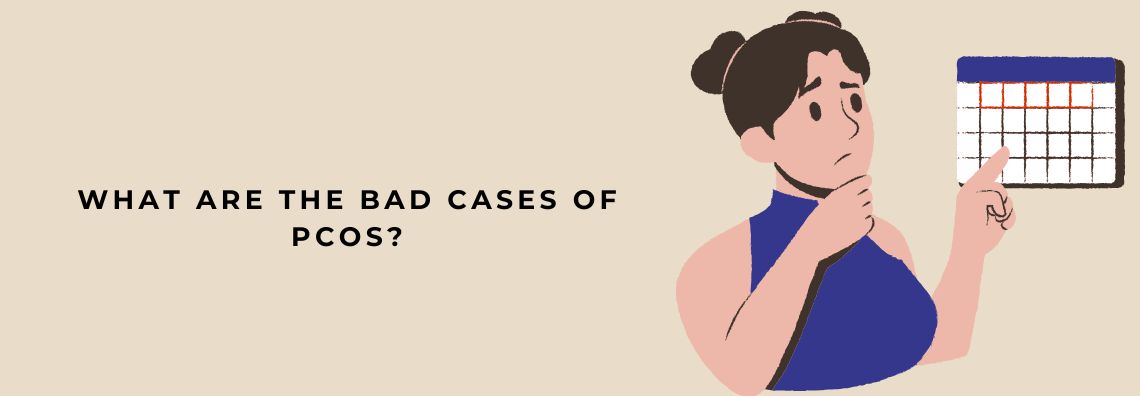
Polycystic Ovary Syndrome (PCOS) may have some bad cases involving severe symptoms like persistent infertility, significant weight gain, development of type 2 diabetes, high blood pressure, severe acne and excessive hair growth (hirsutism). Reproductive compliance, metabolic issues and psychological impact are also involved in severe PCOS cases.
Understand PCOS and its complications which need expert attention. Also, understand the causes of PCOS and who is at risk.
What Is Polycystic Ovary Syndrome (PCOS)?
PCOS is a set of symptoms caused by an issue with a woman’s hormones. It affects the ovaries which store a woman’s eggs. But it can also affect the rest of the body. PCOS is a common condition in women of childbearing age. In some cases, it can lead to serious health issues if not treated on time.
Ovulation happens when a mature egg is released from an ovary. In some cases, a woman does not make enough of the hormones needed to ovulate. When ovulation does not happen, the ovaries can develop many small fluid-filled sacs, known as cysts.
Cysts make hormones called androgens. These are the types of hormones normally found in abundance in men, women normally have them in smaller amounts. Women with PCOS often have high levels of androgens which can cause more serious problems with a menstrual cycle. Many of the symptoms of PCOS are the result of this procedure.
Treatment for PCOS is often done with medicine. Although medicine can’t cure it, it helps reduce symptoms and prevent some health problems.
What Causes PCOS?
The exact cause of PCOS is unknown but it is likely due to a combination of genetics, hormones, lifestyle and environment. Understand in depth here:
Hormones
Hormonal imbalance including androgens, estrogen and luteinising hormone (LH) can cause PCOS. These hormonal changes can make it difficult for the ovaries to release eggs. High levels of androgen interfere with ovulation whereas abnormal levels of LH can interfere with the normal function of the ovaries.
Genetics
Genetics often contribute to PCOS by causing variations in genes that regulate hormone production, particularly androgens, leading to imbalances like increased levels of luteinising hormone (LH) and disrupted ovulation. These can be the key reasons for the condition and these genetic variations can also be responsible for affecting insulin senstivity, further contributing to PCOS development.
Lifestyle
While lifestyle factors alone cannot directly cause PCOS, they can significantly contribute to its development and worsen its symptoms by influencing factors like insulin resistance, particularly through poor diet or bad lifestyle choices. High sugar intake and obesity are strongly linked to the condition, especially when combined with genetic causes.
Environment
Key environmental factors including high intake of processed foods, sugary drinks, saturated fats and a Western-style diet can contribute to insulin resistance. Lack of regular exercise can worsen insulin resistance and contribute to serious PCOS symptoms. Chronic stress may impact hormone levels and potentially lead to PCOS symptoms.
Understand when you need to visit a PCOS specialist.
Serious Symptoms Of PCOS: When To Visit A PCOS Specialist?
You must consult a healthcare provider or PCOS specialist if you have symptoms of polycystic ovary syndrome, especially if you are having trouble getting pregnant or have signs of excess androgen. Some serious symptoms of PCOS include:
- When you are having irregular periods, very long periods or no periods, you need to visit a specialist to get checked on time.
- You may have abnormal hair growth on your face, chest, upper thighs and abdomen as symptoms of PCOS.
- If you are experiencing excess weight gain without even trying or changing your diet, this demands specialist attention.
- PCOS can show symptoms including changes in skin like acne. Women with PCOS, acne, hair loss, excessive facial or body hair growth and dark patches on the skin can count as PCOS symptoms.
- Women who are facing difficulties in getting pregnant need to see a specialist.
Some symptoms demand immediate care from healthcare professionals including excessive weight gain, hair growth, diabetes symptoms (excess hunger or thirst), unexplained weight loss and gestational diabetes.
Living With PCOS
PCOS is a common hormonal condition and while there is no cure, lifestyle changes and medications can help manage symptoms. Take a look at how living with PCOS is in your control:
- Eat a healthy diet that is low in sugar and refined carbohydrates. Add more fruits, vegetables and fibre.
- Losing weight can help lower insulin and androgen levels. It may help restore ovulation.
- Try yoga or meditation to help calm your mind and body.
- Be active and try exercising at least 150 minutes per week.
Exercise, diet and healthy habits can help you manage symptoms of PCOS. Visit a PCOS specialist near you for professional advice.